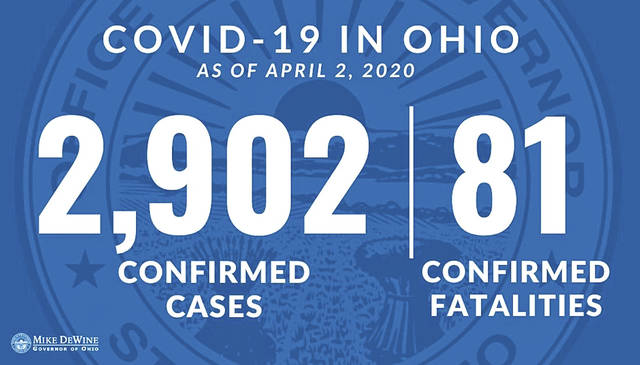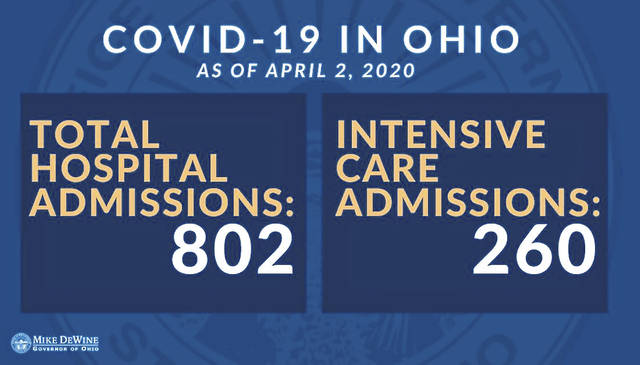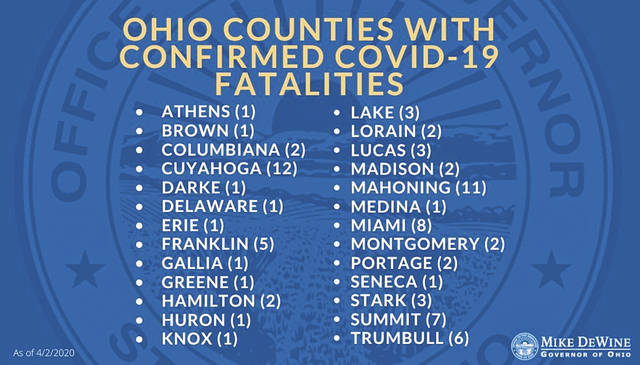


Ohio Gov. Mike DeWine announced the extension of Ohio’s stay-at-home order on Thursday, while Champaign County’s total number of confirmed COVID-19 cases remained at 4, according to the Champaign Health District.
As of 2 p.m. Thursday, Ohio reported 2,902 confirmed cases, 81 deaths, 802 hospitalizations and 260 intensive care unit admissions.
The new stay-at-home order takes effect Monday night and extends until May 1, 2020.
Changes or additions made within this order include:
-Addition of a Dispute Resolution Panel to assist with situations where similar businesses are being treated differently in different counties.
-Requirement for retail businesses to establish a capped number of people to be in the business/store at a given time. This number is not set in the order, but should be determined by the specific business.
-Anyone who is travelling to Ohio from another state will be asked to quarantine for 14 days; there is an exception for people who work across the border.
-No regulation of funerals or weddings, but DeWine is encouraging people to make wise decisions regarding these events. Receptions, however, fall under the requirement of social gatherings to include less than 10 people.
-State parks will remain open, and fishing is allowed. State parks can take action to make restrictions within the parks if deemed necessary to limit overcrowding.
Economy
The state reported 272,117 jobless claims for the week ending March 28, a second straight week of record numbers as businesses grapple with effects of the pandemic. The state has received 468,414 claims in the past two weeks — over 100,000 more than for all of 2019 — while paying out $45 million to more than 108,000 claimants.
A team of experts will be formed to focus on economic recovery in Ohio. This board will be advising DeWine and Lt. Gov. Jon Husted.
Craft store company Hobby Lobby agreed to again close its Ohio stores, Attorney General Dave Yost said in a tweet late Wednesday. Yost had sent a cease-and-desist order following reports that several stores were open in Ohio, demanding proof the stores meet the “essential business” requirements under the state’s stay-at-home order.
DeWine encourages employers to allow employees to wear masks at work. Ordinary masks will protect others from the respiratory droplets of the person wearing the mask. N-95 masks help prevent particles from coming into the person wearing the mask; however these are in high demand on the front lines of the medical battle against the novel coronavirus. Many people are making homemade masks or donating personal protective equipment (PPE). Anyone wishing to donate PPE supplies can contact the Champaign County EMA at 937-484-1642 or email the state at [email protected].
Ohio senators, members of Congress urge USDA approval of Ohio COVID-19 disaster food distribution program
Ohio’s U.S. senators are urging swift approval of the Ohio Department of Job and Family Services’ (ODJFS) request to operate Disaster Household Feeding Program that will get meals to Ohio families during the COVID-19 outbreak.
On Wednesday, U.S. Senators Sherrod Brown (D-Ohio) and Rob Portman (R-Ohio) were joined by some Ohio House Members in a letter to U.S. Department of Agriculture (USDA) Secretary Sonny Perdue urging swift approval of the Ohio Department of Job and Family Services’ (ODJFS) request to operate the Disaster Household Distribution Program. USDA’s Disaster Household Distribution Program is run through the Emergency Food Assistance Program and works to feed hungry families in times of crisis,, like the COVID-19 outbreak, more efficiently and safely. Swiftly approving ODJFS’s request will allow foodbanks throughout Ohio to distribute more food across the state and reduce verification requirements, which will in turn make it easier for staff and volunteers at food banks to maintain social distancing protocols, keeping themselves and their clients safe. In addition to Brown and Portman, the letter was also signed by Reps. Marcy Kaptur, Tim Ryan, Mike Turner, Brad Wenstrup, Marcia L. Fudge, Steve Chabot, Robert E. Latta, Joyce Beatty, David Joyce, Steve Stivers, Troy Balderson, and Anthony Gonzalez.
According to ODJFS, as of March 26, 2020, the state had received more than 187,800 new claims in unemployment in a single week. During this time, many food banks reported a significant – greater than 50 percent – increase in clients, with roughly two-thirds of the total utilizing emergency food services for the first time. ODJFS’ application estimates that 1.25 million Ohioans – 10.7% of Ohio’s population – will be served at food banks by April 30.
“While we appreciate USDA’s proactive issuance of waivers for some nutrition assistance programs and swift adoption of new authority for others, ODJFS requires more tools and additional flexibility to meet increasing demand while keeping staff, volunteers, and clients safe,” they wrote.
They continued, “Ohioans are facing significant economic challenges as the country takes action to halt the spread of COVID-19. As more Ohioans lose work, emergency food providers in every part of the state are seeing a massive increase in demand for food assistance.”
State sends $8.8 million in meal assistance for older Ohioans; federal funds support local Area Agencies on Aging
The Ohio Department of Aging (ODA) is distributing $8.8 million across the state to meet the growing demand for meal assistance by older Ohioans impacted by the coronavirus (COVID-19) public health emergency.
ODA distributed the funds, provided through the federal Families First Coronavirus Response Act, to the state’s 12 Area Agencies on Aging (AAAs) to support meals programming for older Ohioans at highest risk for malnutrition and hunger.
“This funding will help us reach an even greater number of older Ohioans struggling to meet their daily nutritional needs during this extraordinary time,” said DeWine.
Ohio Department of Aging Director Ursel J. McElroy added, “Thanks to these dollars, our AAAs will be able to address waiting lists, expand the number of people receiving home-delivered meals, reach those who previously participated in congregate meals, and provide additional meals per day or per week.”
Ohio’s AAAs respond to the needs of older adults as advocates, planners and funders. They provide education, information and referral services, and work with public and private sectors to help older adults with home and community-based long-term care.
For the latest on COVID-19, visit the Ohio Department of Health website coronavirus.ohio.gov, or call 1-833-4-ASK-ODH.
The Ohio Department of Aging serves and advocates for the needs of Ohioans age 60 and older, as well as their families, caregivers and communities. Programs include home and community based long-term supports and services, as well as initiatives to promote health and wellness throughout the lifespan. Visit www.aging.ohio.gov.




